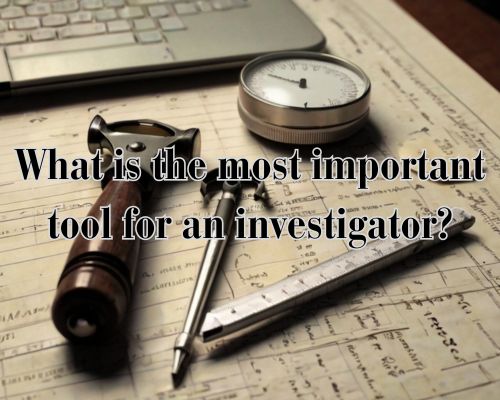
What is the Most Important Tool for an Investigator?
Key Insights You Need to Know
When it comes to investigations, identifying the single most important tool for an investigator can be challenging due to the nuanced nature of the profession.

The most critical tool for any investigator is thorough planning.
Utilizing organization apps such as Google Calendar and Calendly can significantly enhance the efficiency of managing tasks and activities throughout the investigation’s duration.
In addition to these organizational tools, investigators rely heavily on both traditional methods and advanced technologies to gather evidence.
This includes analyzing DNA samples, reviewing CCTV data, and utilizing databases like idiCORE, which offer comprehensive views of connections between individuals, businesses, and assets.
Such diverse tools ensure that investigators leave no stone unturned in their pursuit of the truth.
Law enforcement agencies and private investigators alike must employ a mix of surveillance footage, license plate scanning, and cell phone data to build a solid case.
These methodologies enable investigators like Ali Private Investigator Tampa to meticulously piece together the evidence and construct a clear narrative, ultimately leading to successful case resolutions.
Essential Tools for Modern Investigations
Modern investigations leverage both digital forensics tools and robust case management systems to gather evidence and document findings efficiently. With Ali Private Investigator Tampa, you’ll find key aspects of these tools explained in detail.
Digital Forensics Tools
Digital forensics is critical for analyzing data from computers, mobile devices, and other digital storage media.
Tools like Autopsy/The Sleuth Kit and EnCase are widely used to perform comprehensive examinations.
Autopsy/The Sleuth Kit: An open-source tool assisting in analyzing disk images, file recovery, and timeline creation.
EnCase: A paid tool popular for its user-friendly interface and advanced capabilities in disk imaging and data extraction.
Cellebrite UFED: Essential for mobile device analysis, offering a complete data extraction and decoding solution.
Magnet AXIOM Cyber: This tool is useful for enterprise investigations, combing through digital evidence from various platforms.
Wireshark: A network protocol analyzer aiding in real-time network traffic monitoring and forensics.
Volatility: Specialized in memory forensics, providing deep insight into RAM artifacts and volatile data.
Each of these tools serves a unique purpose in the investigative process, offering both free and paid options to fit different budget requirements.
Case Management and Documentation
Effective case management and thorough documentation are crucial for maintaining the integrity of an investigation.
Case management software such as Case IQ and Magnet AXIOM are designed to streamline this process.
Case IQ: Provides multiple reporting channels, enabling anonymous submissions and easing the collection of case information. Ideal for organizations looking to enhance their investigative workflow.
Magnet AXIOM: Not only useful for digital forensics, but it also includes features for case documentation. It helps in organizing evidence, generating comprehensive reports, and maintaining the chain of custody.
Case Management Software: Useful for private investigators and law enforcement, providing tools for data entry, evidence logging, and communication tracking.
Documentation and Reporting: Important aspects include creating detailed, timestamped records of all actions taken during the investigation. This ensures transparency and legal defensibility.
Utilizing Public Resources and Online Tools
Leveraging public resources and online tools is crucial for investigators when it comes to evidence collection, identifying subjects, and corroborating intelligence. These technologies provide efficient ways to access and analyze digital and physical information.
Online Searches and Digital Archives
Online searches and digital archives are indispensable.
Tools like Google and the Internet Archive allow you to find data quickly.
Social media platforms like Facebook and Twitter can reveal crucial personal information and social connections.
Digital archives, such as those maintained by libraries and institutions, provide access to historical records, academic research, and public documents.
Public records databases, including criminal history and identification details, are valuable for background checks and profiling.
Accessing these resources can help you gather comprehensive information without physically visiting archives.
Intelligence Gathering and Evidence Corroboration
Programs like Maltego and Autopsy are designed for in-depth network analysis and cybercrime investigations.
Maltego helps visualize complex networks, making it easier to connect disparate pieces of data. You can use it to map relationships among individuals, social media accounts, and organizations.
Autopsy is crucial for forensic investigations, especially when dealing with deleted data, disk images, and the Windows Registry.
It’s compatible with major Linux distributions and useful in cybercrime cases.
Tools like IDIS and LVA can help corroborate witness statements by capturing and analyzing conversations.
Knowing how to use these tools allows you to cross-check information, ensuring more reliable outcomes.